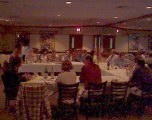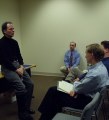danbricklin.com/log
|
||
|
|
Starting November 6, 2002
New Pew Internet survey, People check the web site first, Trellix and Interland, Tablet computing history essay, Trying a Tablet PC, Jim Cash, With my Dad and the cell phone as lifeline
06Nov02-20Dec02
2002_11_06.htm
|
|
|
New Pew Internet survey [link]
The Pew Research Center continues with yet another in their series of wonderful surveys showing the role of the Internet in the lives of regular people in the USA. The latest one, Counting on the Internet, looks at people's feelings about finding information online. The 17 pages are worth reading. The bottom line? From the press release (emphasis added by Dan): "In the past year or so, the Internet has turned into America's go-to tool...the Internet is the norm now in America...Most expect to find key information online, most find the information they seek, and many say they turn to the Internet first when they have a pressing need."
Backing up my last post about Best Buy below, is the following from page 14 of the report (emphasis added by Dan):
With many people relying on the Internet for product information, it is not too surprising that having an online presence – even if a store's Web site is not transactions-enabled – helps bring people into merchants' doors. We presented Americans the following scenario about merchants' online presence: If a store provided only product information online, but did not sell products on its Web site, would you be more likely, less likely, or would it make no difference to you? About half of Americans (46%) said a Web site – even one that did not permit online purchasing – would make it more likely that they would go to the physical store to but the product. Only 6% said that such a Web site would make it less likely that they visit the store, with 45% of Americans saying it would make no difference. These numbers are the same for Internet users and non-users alike. In other words, having a Web site helps a business even if the site does not enable transactions.
Just a case in point: I was driving to New Hampshire yesterday and wanted to find a good place to cross-country ski. A little Google, use of an informational web site, and then looking at the updated web site of a ski area I hadn't heard of, followed by a phone call for some very specific information that wouldn't be on a web site. The result: A wonderful day in the snow-covered woods. No eCommerce.
 Cross-country ski path at NORSK ski area in New Hampshire
People check the web site first [link]
An interesting observation in yesterday's New York Times. In an article titled "A Retailing Mix: On Internet, in Print and in Store" by Saul Hansell, it says that "Best Buy's surveys show that more than half of its customers check its Web site before coming into its stores, up from one-third last year." The article talks a lot about the need for a full marketing mix that includes "traditional" means like print along with Internet. That number, 50%, completely blew me away. If 60% or so of US homes have Internet access, this shows amazing acceptance of the Internet as an information tool.
Trellix and Interland [link]
This afternoon, Interland announced that they have signed a deal to acquire Trellix Corporation, the company that I founded. I'll come on in an executive position, continuing to work with our group up here in Massachusetts. This is exciting and looks to be very interesting. We'll have the resources to do much more than we have in the past. You can read about it in the official press release.
    First Trellix party June 9, 1996 (including guests); Trellix CEO Don Bulens signing merger agreement December 11, 2002; Dan signing one of the agreements (picture taken by Interland CEO Joel Kocher); Joel addressing Trellix employee meeting after the signing
Tablet computing history essay [link]
In response to reaction to my First Impressions essay about the Tablet PC, I've written another one looking at the reasoning behind some of my assertions. I explore a bit of the history of tablet hardware, as well as the state of application software for them in the early 1990's. I even link to a few patents to get detailed descriptions.
Trying a Tablet PC [link]
I went out and bought a Tablet PC. I've written up my experience and my feelings about it. Bottom line: I would buy one again. They are Tablet PCs, not Pen PCs, and understanding that difference is important to understanding the benefits, which are many.
Read "Tablet PC: First Impressions".
Jim Cash [link]
One of my professors from back in the days when I went to Harvard Business School is in the news: Professor James Cash. A recent addition to the Microsoft board (June 2001), he's just been named to head Microsoft's Antitrust Compliance Committee. I think that's a great move.
To help people understand who he is, here's some information about Jim from my experience: As a recent addition to the faculty, he taught me cost accounting during my second semester at HBS, an area that involves careful understanding of details and overviews of a business. In the spring of 1978 when I first went to a few of my professors to describe my still somewhat unformed idea for VisiCalc, he was the only one to emphatically encourage me specifically on the grounds that it was an improvement in human interface. As my only professor with real programming and other computer experience (he has a Masters in Computer Science and was a programmer and a Director of Data Processing at one point), that meant a lot to me. After I graduated, he did some consulting for us at Software Arts, and showed strength in the area of process -- which will serve him well in this capacity of making sure Microsoft has the right processes in place. He was the first African-American tenured professor at HBS, and was a major driver in bringing in early email and other technological advances to the school. He taught not just MBA students, but also the shorter programs where you have to deal with company heads and other senior executives. He rose to chairman of the MBA program and beyond. He has served on the boards of major newspaper publishing companies, Tandy Corporation (a PC reseller), and is currently on the board of General Electric, so he brings a very broad perspective (which may be unusual for someone who fell in love with computers in high school in the '60s). He is the one who invited me to a presentation from CIMIT, the health-sciences and technology research group involving MIT and others that I wrote up early this year.
 Jim Cash at CIMIT meeting
Jim is a very warm, friendly, honorable, and well-liked person, but he is no pushover: An imposing figure, standing around 7 feet tall, he was a star basketball player in his youth (I found his name on the National Association of Basketball Coaches Silver Anniversary All American Teams page along with Kareem Abdul-Jabbar for 1969, and some of his accomplishments are listed in an article in the Fort-Worth Star Telegraph). Looking back over his life so far, he seems a great example of having a strong technology bent be part of, and enhance, a well rounded, extensive career. ("See, being a CS major doesn't mean you're a nerd or will end up living in a cubicle.") He's a sports hero who also made his living from a computer science degree doing programming and more, who then went on to distinguish himself in academia bringing technical innovation and leadership to a major institution, who served on numerous boards providing guidance and advice, and who broke through race barriers in the process. He was there when the PC was first being considered for business, and he's there when it's grown to huge influence. I'm glad this news gives me an opportunity to highlight him. Let's all wish him strength and wisdom to carry out his new duties.
With my Dad and the cell phone as lifeline [link]
I was visiting my Dad in the nursing home yesterday. I took him over to the auditorium to hear Cantor Louise Treitman sing some Hebrew songs. As we sat there, she announced her next song: Shir Ha'Emek. It's the song I still remember my Dad singing to my sister and me as a lullaby when I was 4 and younger. My Dad perked up, and the two of us sang along while I held his hand -- probably two of a very few out of the 125 people in the room to do so since the song is not well known today. My eyes were filled with tears. Memories of a long time ago. I wanted to share the moment some how. Holding his hand was one way, but what about my sister? I didn't have my camera with me, so I couldn't use it's sound record function. I pulled out my cell phone and hit her name on speed-dial, hoping to put some of the sound on her answering machine, but unfortunately it had problems connecting (the problems with cell phones...) and I was too busy singing to pay attention. I waited until the night to call her and tell her about it.
That moment with the cell phone brought up another image I saw earlier in the day: A woman getting out of the driver's seat in her car and opening up the back door to take her small child out of a car seat while still clutching an object in her hand that she obviously felt was important -- her cell phone. I remember thinking: More and more I see people clutching their cell phones as a major source of comfort or something. It's like they are holding onto a railing when they walk down stairs: The cell phone gives them some sense of security. I feel that it represents a lifeline to the rest of our circle of important people, and we treat it as such. It's a space warp that connects us to others we need as we go through life. In today's complicated world, we can juggle our disconnected lives and make them connected by using technology like cell phones, email, IM, and digital cameras. I may be very busy and never be sure where I'll be at any given time, but that doesn't affect my being able to coordinate with others. ("I'm on my way and it looks like I'll get to the building around 8 pm. When I get there I'll call you on your cell phone and we'll figure out where to meet.")
With all the talk about commerce and advertising, I still think that friend-to-friend relationships are a major driving force in our adoption of (and paying for) much of new technology. (If you haven't read it, you should take a look at my "What will people pay for?" essay. In my recording industry essay, I also point out how the huge increases in use of cell phones may explain some of the drop in music sales -- increasingly you see people walking or standing with cell phones pressed to their ears instead of wearing earphones from personal music systems. With email: Can you imagine how unlikely it would have been 10 years ago to think that email would be so important that spam would be a problem that mattered to regular people?)
|
||
|
© Copyright 1999-2018 by Daniel Bricklin
All Rights Reserved.
|
||